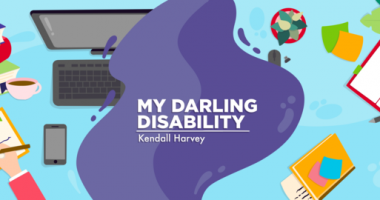I’ll Live With the Pity of Strangers and the Love of Loved Ones

I often think about the pity that is expressed to people with disabilities — people like me. I am an obviously disabled young woman, and my Friedreich’s ataxia (FA) is on full display, making me a regular recipient of unsolicited pity.
Some people stop and stare, some whisper to their companions, and others just give polite smiles. Whether that pity is expressed outright, compassionately tip-toed around, or spoken in whispered conversations, I see it. I see people studying me, trying to put a name to my awkward gait and dependency on a walker. I field questions and concerned exclamations in a tone and manner that matches the tone and manner they were offered to me.
I am told how “brave” I am, or asked “how I manage,” as if the alternative — becoming a depressive recluse — would be an understandable alternative to leading a happy and active life. I try not to let expressions of pity bother me, but I feel them and become self-conscious anyway.
But since these expressions are solely directed at me, the disabled person, they feel logical. I have become accustomed to these feelings and am able to process them easily. It’s when expressions of pity are directed toward my loved ones that I still struggle.
When I am with one or both of my kids, I can feel those around me collectively holding their breath as though I might spontaneously worsen and accidentally injure myself or my children. I get a lot of looks as a visibly “disabled mom,” but most of the pity seems to be directed at my children, as though their existence is somehow far worse off than other kids their age because their mom is fragile, incapable, and disabled.
My “mama bear” instincts come out here, because these transparent thoughts are, of course, preying on my worst fears. I do constantly worry that I am an inadequate mother, so when my kids are the recipient of pity through no fault of their own, it seems heartbreakingly unfair.
Perhaps the most noticeable pity is the brand that my husband, Kyle, receives. When people see him grabbing my walker out of the truck, offering me a helping hand, or patiently assisting me in some way, they stare. They see a strong and handsome man helping a disabled woman. And when you add our kids into the mix, we are even harder to not notice.
People might as well have their thoughts closed-captioned. I can see them trying to figure out how someone like him ended up with someone like me. I can feel their pitiful stares and loaded looks. I can hear people whispering, “Man, he’s a saint for sticking by her, even though she’s disabled.”
The most ironic part is, they’re right. He is a saint. Although I am the one physically going through FA, Kyle carries the heavy, burdensome weight of a life with FA right alongside me. This unfair disease is happening to him as much as it is to me.
I’m thankful that he has thick skin and doesn’t let the daily emotional grind of FA get to him. I’m fortunate that he doesn’t notice most of the stares and whispers. I’m grateful that he carries even more than his fair share when the pity, and the circumstances that brought on this pity, are just too much for me to bear.
Most of all, I am so incredibly blessed that he took his marriage vows seriously. Although neither of us had FA in mind when we promised to love and cherish each other in “good times and in bad, in sickness and in health,” and for as long as we both shall live, he fulfills his part of that vow on a daily, if not hourly, basis.
So, yes, Kyle is a saint for sticking by me through FA, because I quite literally wouldn’t be standing today without him. And if looks of pity and my unending love and appreciation are the prices he has to pay for it, then so be it.
All this to say, I love you, Kyle. Thank you for doing life with me.
Friedreich’s Ataxia News is strictly a news and information website about the disease. It does not provide medical advice, diagnosis or treatment. This content is not intended to be a substitute for professional medical advice, diagnosis, or treatment. Always seek the advice of your physician or another qualified health provider with any questions you may have regarding a medical condition. Never disregard professional medical advice or delay in seeking it because of something you have read on this website.The opinions expressed in this column are not those of Friedreich’s Ataxia News or its parent company, BioNews, and are intended to spark discussion about issues pertaining to Friedreich’s ataxia.








Comments
pasquale asaro
solo ora ho scoperto Kendall,penso che leggerlo mi aiuterà molto a come porgermi e dialogare con mia nipote Chiara ,affetta di Atassia di Fridrerich's.
Spesso mi parla dei suoi desideri che la sua malattia non le permette e non so come confortarla, risponderle, consigliarla, darle una alternativa..........
Spero molto di ricevere un grosso aiuto nella lettura delie tue colonne/messaggi.
Grazie
Pasquale
Translation: only now have I discovered Kendall, I think reading it will help me a lot in how to approach and communicate with my niece Chiara, affected by Fridrerich's Ataxia.
She often talks to me about her wishes that her illness doesn't allow her and I don't know how to comfort her, answer her, advise her, give her an alternative……….
I very much hope to get a lot of help in reading your columns/messages.